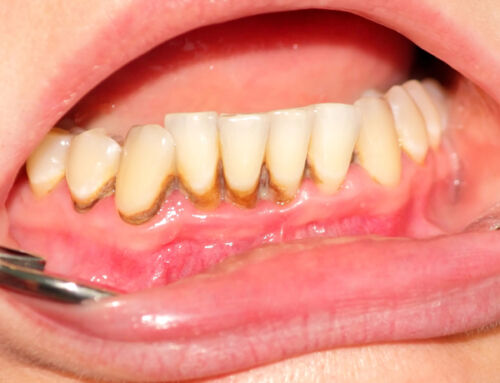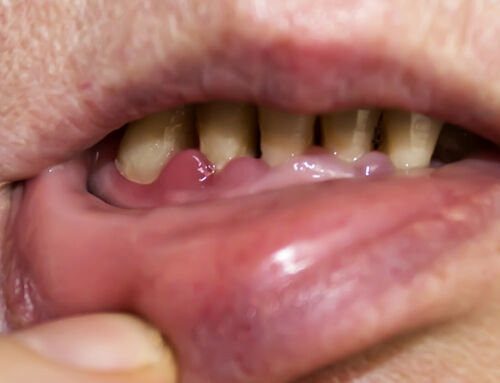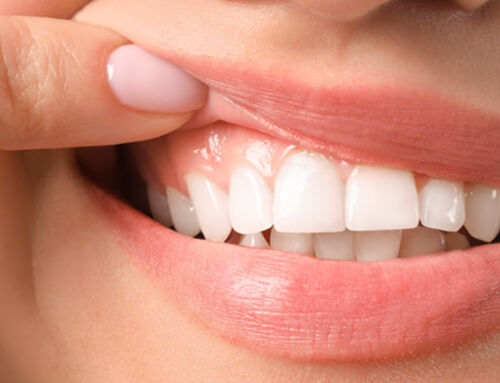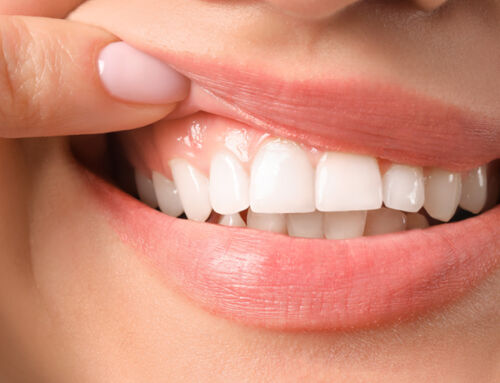Gingivitis is the earliest stage of gum disease. It is the inflammation of the gums, usually caused by plaque build-up. Bacteria from plaque and other debris irritate the gums and cause infection.
In its early stages, gingivitis can be reversible and will not cause permanent damage to the gums and teeth. Your gums should return to good health with proper treatment and hygiene care.
However, if left untreated, gingivitis can rapidly progress to irreversible periodontal disease. This is a serious condition that can affect the bones surrounding the teeth, eventually leading to tooth loss.
The management of gingivitis involves regular dental visits for teeth cleaning and a lifetime of preventive oral hygiene care. These will help keep the teeth and gums clean and bacteria-free for a healthy and beautiful smile.
Signs and Symptoms of Gingivitis
The symptoms of gingivitis vary depending on the severity of the condition. Some do not even know they have gingivitis as it may come without symptoms during its early stages. Gingivitis may also develop on all teeth or just one tooth.
Some of the common signs and symptoms are:
- Red, tender, swollen gums
- Gums that easily bleed when you brush or floss
- Gums that have pulled away from the teeth
- Bad breath that lingers even after brushing
- Teeth sensitivity
- Tenderness or pain when chewing
Advanced gum disease leading to periodontitis causes infection of the bones supporting the teeth. This will make the teeth loose and change how the teeth fit when you bite. If you are using dentures, they may also fit awkwardly, making it difficult for you to use them.
Causes of Gingivitis
Anatomically, the gums are not fully attached to the teeth. They are attached at a lower point than the visible gum edges. The area with unattached gums is called the sulcus. Gum disease happens when plaque and other debris accumulate in the sulcus causing gum infection or gingivitis.
Plaque build-up is the leading cause of gingivitis and this happens mainly due to poor oral hygiene. Eventually, plaque will harden into tartar and calcular deposits that will continue to irritate the gums.
Risk Factors of Gingivitis
Aside from poor oral hygiene, other factors and habits that may contribute to developing gum disease are:
- Smoking or chewing tobacco
- Diabetes
- Medications (oral contraceptives, steroids, anticonvulsants, antihypertensives, etc)
- Crooked teeth
- Pregnancy
- Ill-fitting dentures or dental appliances
- Genetics
- Suppressed immune system
How to Prevent Gingivitis
Gingivitis is a highly preventable disease. The most effective way to do so is to practice proper and consistent hygiene care. This includes:
- Routine dental visits for check-ups and cleanings
- Brushing at least twice a day using fluoride-rich toothpaste
- Flossing and rinsing with antibacterial mouthwash
Other preventive methods also include breaking poor oral habits, such as smoking, and disease management for diabetes-induced gingivitis.
Professional Treatments for Gingivitis
If there is already existing gum disease, treatment is necessary to bring back the health of the gums. Treatment may range from thorough teeth cleaning to more advanced techniques such as lasers and surgery.
- Scaling and root planing
Early gum disease can be treated by removing plaque, tartar, and debris underneath the gums. Once these irritants are removed, the gums should return to its normal state. Scaling and planing involve cleaning down to the tooth roots to remove dirt and infected tissues.
- Lasers
Aside from manual removal of plaque, lasers may also be used. This modern technique for teeth cleaning promotes improved comfort, less bleeding, and faster healing after the treatment.
- Medications
Some medications that can be useful for the treatment of gingivitis include:
- Antibacterial mouthwashes to swish away bacteria
- Antiseptic chips are used after rigorous teeth cleaning to eliminate bacteria under the gums
- Oral antibiotics to treat persistent gum inflammation
- Surgery
For severe cases of gum and periodontal disease, surgery can be used as an adjunct to the treatment. This improves the appearance of the smile if there is any gum or bone loss involved.
Some surgical procedures that can be helpful for the treatment of gingivitis are:
- Gum flap surgery – this is the leading method for repairing gums that have pulled away from the teeth due to gum and periodontal disease. To do this, your dentist will sew a flap of gum tissue over the affected area, effectively decreasing the pocket and reshaping your gumline.
- Bone and tissue graft – this procedure is opted if there is too much damage on the gums and bones. Grafts are placed over the area of gum and bone loss to allow for tissue regeneration and to improve the appearance of the gums.
The Importance of Follow-Up Care
After going through treatments such as teeth cleaning and surgery for gum disease, the next thing to do is to maintain the health of the mouth through follow-up care. This is necessary in your treatment for gingivitis as it will prevent the recurrence of the disease.
Follow-up care includes routine visits to your dentist every six months. For some with advanced gum and periodontal disease, your dentist may recommend quarterly visits for regular oral health monitoring.
Aside from dental visits, keeping your oral hygiene in check at home is also crucial. Proper toothbrushing, flossing, and using mouthwash will prevent future problems with your teeth and gums.
How to Treat Gingivitis – Conclusion
It is good news that gingivitis is a reversible condition. The sooner the disease is detected and treated, the lesser the impact on your oral health. It can also save you from a lot of worry and money in the future.
However, do not take gingivitis for granted because leaving it to progress without the proper intervention can lead to advanced gum disease and periodontitis.
If you see any of the signs and symptoms that may indicate the presence of gingivitis, set up a visit to your dentist for urgent treatment.
At Chinook Dental, we recommend seeing your dentist regularly for cleaning and checkups, not just when you have dental issues. This prevents the need for invasive and expensive treatments. Schedule your routine dental care appointment with us today for a healthier and happier smile!






